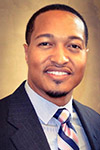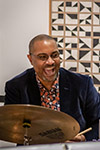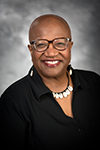Evolution of Contemporary Gospel Drumming
Presenter: Dr. Lamon Lawhorn is an Assistant Director of Bands at North Carolina A&T State University coordinating all aspects of the University Band Percussion Ensembles. Dr. Lawhorn also teaches courses within the Department of Music and conducts the University Wind Ensemble.
A native of Fort Worth, TX, Dr. Lawhorn received his Bachelor of Music Degree in Music Education from Prairie View A&M University, a Master of Music Degree in Percussion Performance from the University of Mississippi and a Doctor of Musical Arts degree from the University of North Carolina at Greensboro in Percussion Performance.
The art of gospel drumming has risen amongst the ranks within the drum community and is now recognized as a style in and of itself. This presentation will discuss research regarding the performance evolution of contemporary gospel drumming. The purpose of this research was to trace the brief history of contemporary gospel drumming and inform the percussion community of the importance of this unique performance style. Through the analysis of listening examples and in-depth interviews with prominent drummers, the study was animated by the following research questions:
- How has gospel drumming evolved?
- How have secular styles and performers influenced the drumming within gospel music?
- How has the technique (fills, solos, etc.) expanded in application and difficulty?
The evolution of the playing styles has been identified through four main characteristics:
- drum and song introductions;
- regional based fills;
- shout music;
- drum solos, interludes and reprises.
Video & Additional Material:
Gospel Music in School Contexts: Style vs Substance 
Author and Presenter: Dr. Jason Thompson is a proud NC native having served as an administrator for Kansas City, Kansas Public Schools and as a professor and researcher at Arizona State University and Appalachian State University. His courses, research and service commitments explore sociocultural influences on the musical experience, socially engaged practices in the arts, and music making in urban contexts. Dr. Thompson brings more than 30 years of professional experience working with gospel choirs in community and academic settings. At both ASUs, his credit-bearing gospel choir ensemble boasted more than 125 singers. Dr. Thompson’s gospel music octavos are published by GIA Music and Hinshaw Music, and his articles are published in Music Education Research,Music Educators Journal, Missouri School Music and Antiphon.
Repertoire is the center for choral curriculums and ensemble conductors and other music teachers are often charged with the responsibility of selecting appropriate repertoire that meets the varying needs of students. Despite the increasing availability of gospel music octavos, the quality among scores varies greatly, bringing their usefulness as teaching resources into question. Additionally, the ways music teachers approach the gospel music culture as style or substance can yield different musical experience for singers. This session gets “under the hood” with gospel music through frameworks for studying and performing gospel music.
Have No Fear: Hip Hop is Here
The History of Hip Hop and Its Place In the Music Education Classroom
 Author and Presenter: Thomas E. Taylor, Jr. is a full-time percussion professor at North Carolina Central University and he’s on the Jazz faculty at The University of North Carolina at Greensboro where he teaches drumset and Hip Hop music appreciation classes.
Author and Presenter: Thomas E. Taylor, Jr. is a full-time percussion professor at North Carolina Central University and he’s on the Jazz faculty at The University of North Carolina at Greensboro where he teaches drumset and Hip Hop music appreciation classes.
This session explores the origins of Hip Hop, provides fun listening exercises, and provides ideas for incorporating Hip Hop in your class. Currently, Hip Hop shows up in nearly everyone’s daily life. Historically, music education focused on a narrow scope of musical styles that have excluded many. A large percentage of our students know and love hip hop music and culture, while some of us didn’t grow up with it and may not share the same passion. It is a good idea to try to find ways to connect with our students and Taylor believes Hip Hop music and culture is the “essential link”. If we want “musical passion” and music education to grow in the classroom, we should embrace the practice of including Hip Hop as part of the music curriculum.
If you weren’t able to see it live, you can watch the presentation here.
Culturally Responsive Teaching: What It Is and Why It’s Important In Music Education
 Author and Presenter: Dr. Connie McKoy, Marion Stedman Covington Distinguished Professor and Director of Undergraduate Studies at UNCG School of Music.
Author and Presenter: Dr. Connie McKoy, Marion Stedman Covington Distinguished Professor and Director of Undergraduate Studies at UNCG School of Music.
This session provides an overview of four principles of culturally responsive teaching, and how music teachers can apply these principles effectively to make learning more meaningful for students.
If you weren’t able to see it live, you can watch the presentation here.

